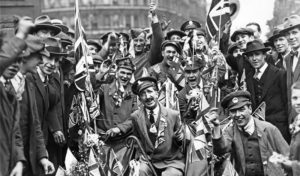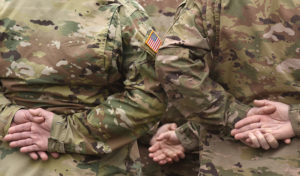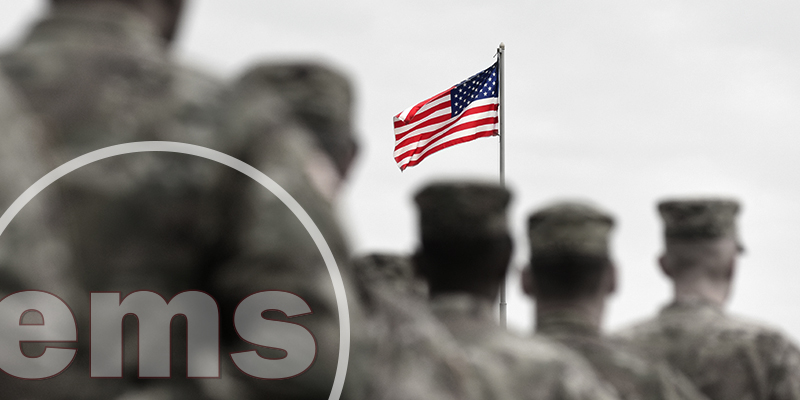Every year, Americans celebrate Veterans Day. But, what is the meaning behind this holiday? Here’s what you need to know about Veterans Day history.
About Veterans Day History: Understanding Its Origin
World War I, also known as the Great War, ran from July 1914 to November 1918. The war lasted 4 years, 3 months, and 2 weeks, affecting many places around the world. It claimed millions of lives — both soldiers and civilians — and injured many more.
Although the signing of the Treaty of Versailles, which officially ended the war, took place on June 28, 1919, the fighting ceased months prior. In 1918, at the 11th hour of the 11th day of the 11th month, an armistice between the Allied nations and Germany was made. Because of this armistice, many deem November 11, 1918, as the day the war stopped.
The Birth of Armistice Day
 A year later, U.S. President Woodrow Wilson proclaimed November 11 as the first Veterans Day, then known as Armistice Day. Originally, the day was intended to celebrate the end of the Great War by holding parades and public meetings. Business would briefly shut down starting at 11 a.m. in commemoration of the 11th hour.
A year later, U.S. President Woodrow Wilson proclaimed November 11 as the first Veterans Day, then known as Armistice Day. Originally, the day was intended to celebrate the end of the Great War by holding parades and public meetings. Business would briefly shut down starting at 11 a.m. in commemoration of the 11th hour.
In 1926, a Congressional resolution officially recognized the day as Armistice Day, with President Calvin Coolidge issuing a proclamation. It was not until 1934, though, that November 11 became a legal holiday.
On May 13, 1938, an Act officially passed, declaring the 11th of November a legal holiday every year. At the time, the day was still known as Armistice Day. It was meant to commemorate the fight for world peace and the day that ended “the war to end all wars.”
Unfortunately, not long after, World War II broke out. The Second World War marked the greatest mobilization of the American armed forces in history. The Korean War, in which many American soldiers fought, took place after that.
The History of Veterans Day
The original intent behind Armistice Day was to dedicate a day to the veterans who fought in World War I. But, in 1945, World War II veteran Raymond Weeks came up with the idea to celebrate, not just veterans of WWI, but all veterans. Dwight Eisenhower, a general at the time, supported the idea. In 1947, Weeks held the first national celebration of Veterans Day in Alabama. He would do so every year until his death in 1985.
On May 26, 1954, President Eisenhower signed a bill establishing the holiday. On June 1, 1954, Congress amended the bill to use “Veterans” instead of “Armistice.” Since then, the holiday became known as Veterans Day.
Meaning of Veterans Day: Why Do We Celebrate It?
Veterans Day is a federal holiday in the United States. To some, it is an extra day off from work or school. But, the importance of this holiday bears its roots in Veterans Day history, and it is integral that all American understand its gravity.
Veterans Day honors military veterans who were discharged in conditions other than dishonorable and served in the United States Armed Forces. It remembers all military veterans, celebrating their service and dedication to the country.
Apart from having the day off from school or work, Veterans Day usually sees the closure of all non-essential federal government offices. Post offices also close for the day, which means Americans don’t get their mail on Veterans Day.
Traditionally and legally, Americans are encouraged to observe two minutes of silence at 2:11 p.m. Eastern Standard Time.
Apart from the parades and the two-minute moment of silence, Veterans Day also sees National Ceremonies that take place at Arlington National Cemetery. The President’s Veterans Day National Committee takes charge of the ceremonies at Arlington as well as ceremonies in other parts of the country.
Why Isn’t Veterans Day on a Monday?
Many federal holidays fall on a Monday in accordance with the Uniform Monday Holiday Act. And there was a time when Veterans Day also fell on a Monday.
In 1971, the government moved Veterans Day to the fourth Monday of October. For the next several years, the United States celebrated Veterans Day on a Monday. However, in 1978, President Gerald Ford shifted the day back to November 11 because of the historical meaning behind the date.
As previously stated, Americans typically get the day off from work or school on Veterans Day. But, what if the holiday falls on a weekend? If the holiday falls on a Saturday, the government as well as private companies may designate the preceding Friday as a day off. Similarly, if the holiday falls on a Sunday, the observance moves to the succeeding Monday. Some private companies may also use it as a floating holiday, allowing employees to swap it out for some other day.
Veterans Day vs Memorial Day vs Armed Forces Day
 Veterans Day is not the only holiday that commemorates military personnel. The service of military personnel in the United States is so significant that many confuse Veterans Day with two other days: Memorial Day and Armed Forces Day. But, what is the difference between the three?
Veterans Day is not the only holiday that commemorates military personnel. The service of military personnel in the United States is so significant that many confuse Veterans Day with two other days: Memorial Day and Armed Forces Day. But, what is the difference between the three?
Veterans Day celebrates all military veterans who served in the United States Armed Forces. On the other hand, Memorial Day honors personnel who fought and died while serving in the United States Armed Forces. Memorial Day takes place on the last Monday of May and also sees ceremonies take place at Arlington National Cemetery.
Finally, Armed Forces Day falls on the third Saturday of May. The day celebrates those who are currently serving in the five military branches of the United States, namely the U.S. Army, the U.S. Marine Corps, the U.S. Coast Guard, the U.S. Navy, and the U.S. Air Force.
For Americans Everywhere
Veterans Day history is an important subject matter that all Americans should know. Along with Memorial Day and Armed Forces Day, Veterans Day honors the service of military veterans who have fought and continue to fight for the freedom of Americans everywhere, even at the risk of their own lives. Show your patriotism this Veterans Day by observing a moment of silence, watching a broadcast or live stream of the National Ceremonies at Arlington, and generally supporting military veterans.
RELATED ARTICLES:
- Can The HOA Ask Homeowners To Remove Holiday Cross Display?
- HOA Flag Display: When Should It Be Allowed And Prohibited?
- Looking Back On Columbus Day History







